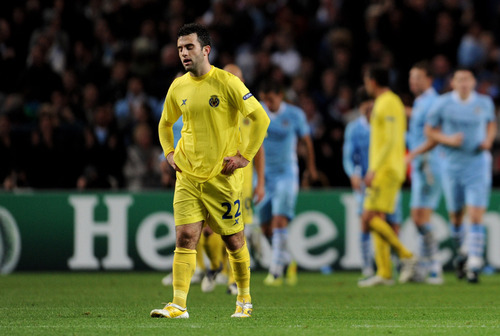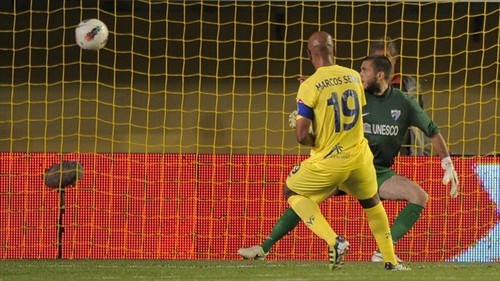Hindsight is a wonderful, terrible thing for Villarreal.
Hindsight is a wonderful, terrible thing for Villarreal.


By Jake Allingan and Conor Murphy
In the 2010/11 season, Villarreal earned themselves Champions League football, taking their previous ability to move the ball seamlessly to a new degree; it was swiftly shifted from side to side, around many a helpless opposition team. Many looked on and said: ‘this is the team that can break the big two,’ and they were right. But, as is so often is the case in football, things never happen as they should, and Villarreal’s potential to topple the monopoly evaporated in front of our eyes.
In the 2011/12 season, they earned themselves Segunda Division football. The cruelest part of this broken fairy-tale is that it was all avoidable.
Villarreal represented the sport’s perfect eco-system, as exciting football lived in cohesion with a family atmosphere. At the beginning of the season, El Submarino Amarillo expected to dive to the icy waters of the Champions’ League, yet instead found themselves submerged in the heat of relegation, the poles seemingly reversed.
The Villarreal tree reached its peak in the past few years, with Champions’ League football a normality and rare seeds hanging off its branches, yet it seems now that the woodland in which Villarreal CF was planted has been hit by deforestation. Yes, some of its products were picked off prior to the season and yes, star Giussepe Rossi was plagued by injury, but the oak should not have been felled.
So, what went wrong?
The injury to Rossi was, naturally, key to their plummet; a striker who can score 18 goals in 36 games would be missed by every single team on the planet. Nilmar, who often played up front next to the Italian, could score just four times, whilst Marco Ruben hit the net nine times in 31.
Santi Carzola, a man who has just been selected for the Spanish Euro 2012 squad, was sold to moneybags Malaga for £20 million, whilst replacement Jonathan de Guzman failed to fill the large void left by such a small man; the Yellow Submarine were unable to dive under the radar with an acute bit of business which they had done so frequently before. Their decision to retain the charismatic former United front-man Rossi, rather than the stinging, creative and intelligent left wing-midfielder (as Arsene Wenger describedhim), proved to be the wrong one. Carzola netted a handsome nine goals, whilst Rossi found himself out for nine months.
They won on just eight occasions, with only two of those victories coming on the road – as a supposedly strong team, it’s unacceptable to fail to pick up points on the road. It seemed as though the patent on the brand of attacking football which had defined Villarreal in previous seasons had expired, the formula now open to observation and scrutiny.
And manager Juan Carlos Garrido was sacked in December with the team in 17th position, having just been knocked out of the Copa Del Rey…
Why was that a factor in their demise?
Some people would argue that Garrido’s sacking was justified, that he deserved to be sacked after opening the wrong door of his house and accidentally leading his trusting team into the musty, unfamiliar cellar of the relegation zone. But the previous season, Garrido had led his team to the Europa League semi-finals as well as Champions’ League qualification. Such a manager has forged a CV of trust, and as such should have been allowed to deliver success with the yellow haze of talent which he had constructed; trusted that his team would soon be playing as one, as they had done on so many occasions before.
Brian Clough once said: 'if a Chairman sacks his Manager, he should sack himself as well’ - Fernando Alfonso delivered the cruellest of cruel blows. The sacking of Garrido delivered the sucker punch to the team that needed a motivator, a tactician and a believer in the system that had been so elusive in the Yellow Submarine’s rise to the top.
The perfect comparison is the Wigan team that lost nine consecutive games this season - they faced the peril of relegation, staring fixtures against Liverpool and Arsenal in the face. A switch to a revolutionary 3-4-3 was the change they needed, and they beat both the Gunners and the Reds to remain safe for another year.
Both teams were in a very similar situation, and the difference between the sides was ultimately the owner. Garrido had led the Yellow Submarine to victory in a very stylish fashion, gaining plaudits internationally, while his formation, (which could be described as a narrow 4-4-2, or even a 4-2-2-2) was incredibly fluid and delivered wonderfully fast passing football.
His dismissal was greeted with antipathy around the country; such an exciting manager, delivering equally exciting football, was culled before his time - in stark contrast to Martinez. Perhaps there could have been similarities between the two cases, but ultimately it wasn’t to be. One manager sacked, one manager kept – one team relegated, and one earning innumerable plaudits.
In terms of tactics, fluidity was the key component lacking. Borja Valero looked uncomfortable without sidekick Carzola to deliver to, whilst the front two didn’t look the same as the Nilmar/Rossi combination that was so elusive and impressionable the season before. Garrido had an ability to get his team to think as one, but they seemed reluctant to work as one as well.
This was first shown on a cool night in April 2011. The seeds of doubt were sown when Emery’s Valencia side lined up against Garrido’s Yellow Submarine. In the reverse fixture, Emery had lined up with a three man defence, yet, after grabbing an early goal, Valencia could only manage a 1-1 draw.
On this night, he got it totally right, as a full strength Villarreal side were felled, 5-0. Villarreal’s title as the ‘best of the rest’ was up for grabs, and they have been in free-fall ever since. The gift of hindsight is, as they say, 'a wonderful thing’, and it often acts as a proverbial highlighter, making mistakes stand out like someone strolling down Matt Busby way clad in sky blue.
What it doesn’t show us, however, is what would have happened in a different scenario – what if that goal against Germany hadn’t counted in 1966, or that other 'goal’ against them in 2010 had?
It instead leaves us with a cliffhanger, relishing watching us erroneously paste over the memories with our own idyllic scenarios. And so that leaves us in the present, wondering what might have been had Garrido been afforded the gifts which Dave Whelan lavished upon Roberto Martinez. That 'what’, we feel, is simple – Liga BBVA football in 2012/13.

But then reality kicks in, and we realise Rossi, Nilmar, Marcos Senna and the whole of Villarreal must swap Barcelona for Barcelona B. And the Primera Division will not look the same without them.
This piece was written by Jake Allingan and Conor Murphy, who also maintain the blog Some People On The Pitch. Comments below please.







